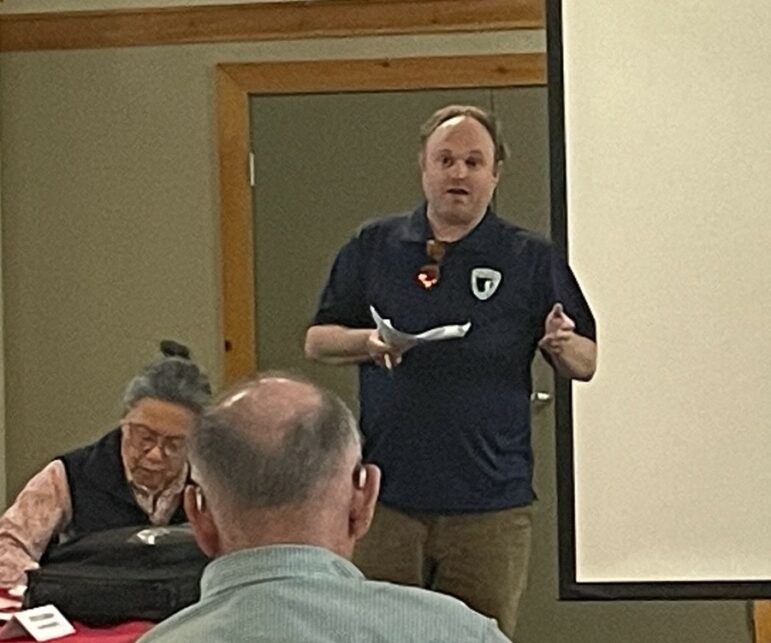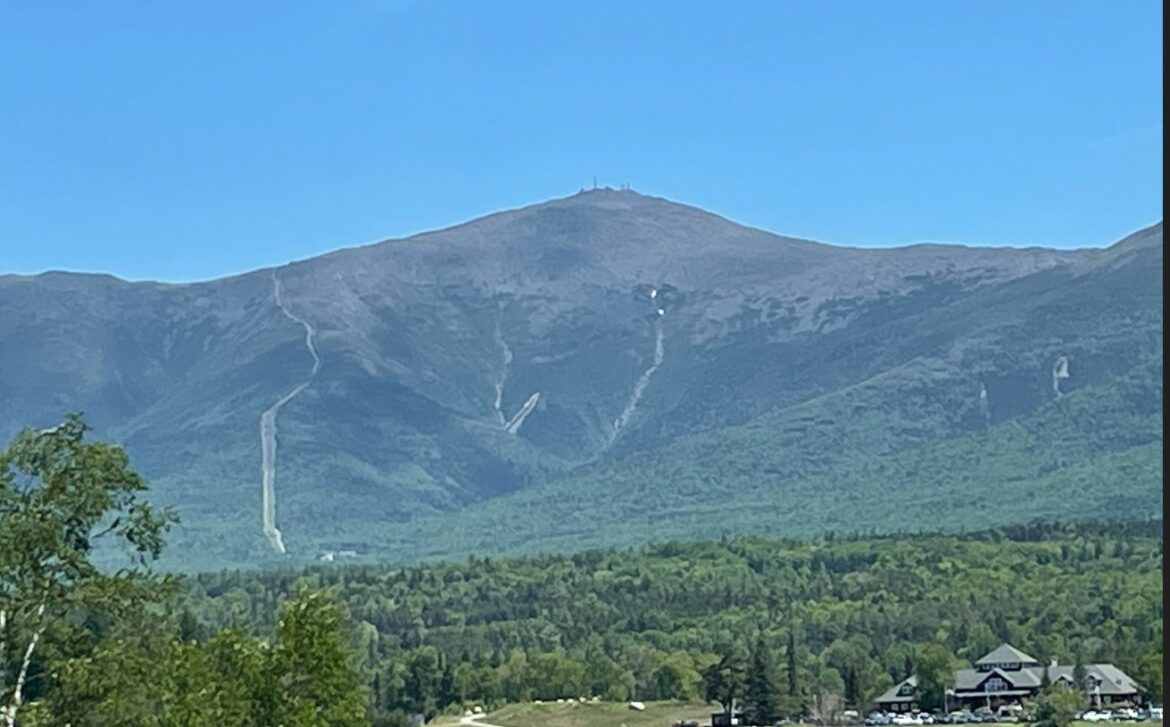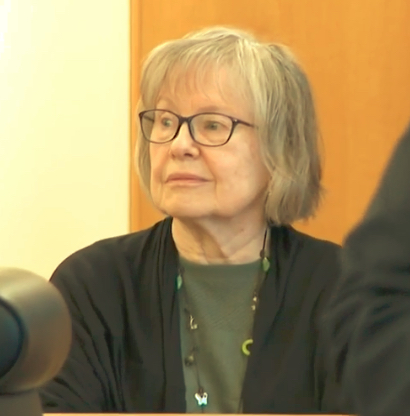
By PAULA TRACY, InDepthNH.org
TWIN MOUNTAIN – Changing the name of Mount Washington to its Native American name, Agiocochook, got a “no comment” from the Mount Washington Commission on Friday.
The idea will not be addressed by the body until it does its homework, but several members said they would be recusing themselves from a vote.
The meeting, held in the shadow of the 6,288-foot peak at the AMC Highland Center Friday, was the second public discussion of the concept, proposed by Easton resident Kris Pastoriza who argues the current name is inappropriate because President George Washington had ties to slavery.
Pastoriza’s formal request to the U.S. Board on Geographic Names Committee is being reviewed by various state and federal departments which deal with the mountain, including the Mount Washington Advisory Committee which by statute since 1961 governs the summit operations on Mount Washington.
At the May 19 meeting, there were initial concerns expressed by members, according to its minutes.
Also offering comments to the federal Board on Geographic Names were the New Hampshire Fish and Game, the state Department of Safety, the Department of Business and Economic Affairs, and the U.S. Forest Service, among others.
At Friday’s meeting, Chairman Ed Bergeron asked who was going to speak for the commission publicly on the issue as it has generated media inquiries. He was told that he, as chair was most appropriate.
Sarah Stewart, the commissioner of the state Department of Natural and Cultural Resources, noted that she has submitted a public statement but as a member of the commission, her position should be separate from the commission.
“The public deserves a commission spokesperson,” she said.
Before the meeting, she told InDepthNH.org that her comments, which are public but did not yet appear available online. She said she has concerns about the public safety aspects of a name change and potential confusion to visitors but noted there could be ways to improve interpretation for public visitors about the naming and about the history of Washington.
Derek Ibarguen, supervisor of White Mountain National Forest, said he would abstain as a member of the commission and would not speak to it as his agency is doing its own assessment.
Howie Wemyss, representing the Mount Washington Auto Road on the commission, said the commission has no comment to make yet “because it is not ready, period” and members should not be making individual statements on behalf of the commission.
Chris Thayer, representing the Appalachian Mountain Club, said the issue is complex and being discussed at many levels within his organization, and “we are nowhere near ready” to talk.
“We start by listening,” he said. “That is our aim. I would be abstaining from a vote anyway today.”
Wayne Presby, owner of the Cog Railway, said since the members all agree to more research he wanted to know how it would be getting information and what should be studied.
He suggested there be a request for information being received by BGN.
It will be included on the agenda of the committee when it meets next, chairman Bergeron said.
Minutes from the previous meeting on May 19 indicate the commission had an initial discussion on the proposal and members expressed concern that a name change would cause confusion as it relates to economic activity, public safety, and search and rescue operations.
There is an area of the mountain that bears the name Agiocochook Crag, it noted.
Sen. Carrie Gendreau, R-Littleton, who is a member of the commission disclosed that she is Abenaki.
Named Mount Washington in 1784, it is also the name of a well-known hotel, an auto road, a meteorological observatory, and a commercial motor vessel on Lake Winnipesaukee to name but a few.
Many of those entities are represented on the Mount Washington Commission.
This is by no means the first time that attempts to change iconic peaks in the nation have been made and some have even succeeded.
The name of the highest mountain in North America was changed from Mount McKinley to Denali, officially by the federal government when then-President Barack Obama visited Alaska in September 2015.
Although the state of Alaska requested in 1975, that the mountain be officially recognized as Denali or the native Deenaalee “the high one” by the Koyukon people, it took 35 years for it to become official.
A gold prospector unofficially named the 20,194-foot peak after then-presidential candidate William McKinley and efforts to change the name were thwarted long after his election and assassination by his home state of Ohio.
On June 18, Easton resident Kris Pastoriza wrote an op-ed piece published by InDepthNH.org that the U.S. Board on Geographic Names recently acknowledged proposals to change both the name of Mount Washington to Agiocochook, and the Baker River to
.
“The BGN is responsible for standardizing geographic names for use by the Federal Government, and its members must approve any new name or name change before it can appear on Federal maps and products. We will prepare a case brief for the proposed change and add it to the BGN’s next Quarterly Review List for consideration by all interested parties,” it read.
Pastoriza noted that “local and state opinion is important to the BGN.”
“Of course, because of the significance of this feature and the well-established and widespread use of the existing name, the BGN will wish to see additional support from others interested in the mountain.”
In nominating the change, Pastoriza noted that George and Martha Washington engaged in slavery.
One of their enslaved women escaped and fled to live in freedom in New Hampshire and the state recently approved Ona Judge Staines Day, honoring her.
Pastoriza also has made an argument to change the name of the Baker River north of Plymouth in Grafton County, noting that it was named for a lieutenant who led an expedition against the Abenaki in which several were killed and for which Baker collected scalp bounties.
Interested people and organizations are encouraged to submit comments on these proposals to the U.S. Board on Geographic Names at BGNEXEC@usgs.gov.
A petition supporting the name change has over 250 names so far at https://www.change.org/p/new-hampshire-state-house-rename-mount-washington-to-original-indigenous-name
At a trailhead for Mount Washington on Friday hiker Colleen Hartmann of St. Louis, Mo. said she did not think it was a good idea to change the name and try to erase history. Rather, she said it was important to acknowledge it and perhaps offer an interpretation of the issue.
“I am tired of everyone trying to change names,” she said.
STATE ALLOCATES $1M FOR SUMMIT ASSESSMENT
Budget allocations for the state in the next two years, now approved, include $1 million to engage a firm to assess the summit for both environmental and infrastructural needs for the future.
It was a key takeaway from a recently approved 10-year master plan for the park at the summit as one primary concern expressed by the public was related to the intense use of the iconic peak.
“There is a lot of work ahead of us,” said Stewart, commissioner of the state Department of Natural and Cultural Resources.
She said Parks Director Brian Wilson has submitted another draft for the scope of work and come up with goals and timelines.
Wilson said it will begin with a request for qualifications. Then a subcommittee might have a review and then a request for proposals with qualified applicants.
The firms will need both experience in the ecological and the infrastructure side as well, he said.
Whether they should be equally weighted or sequential was debated.
Phil Bryce, retired parks director and a member of the public said it needs to be a very focused document.
Wemyss said Bryce is right to narrow it, but also focus on the environmental assessment of how the summit is now and how we can protect it with infrastructure needs.
Chris Ellms, a member representing the public, said you could put the most important issues in phase one and the lesser issues in phase two.
Rob Kirsch of the Mount Washington Observatory, urged them to stay true to the 10-year document which the commission worked on extensively for the past year.
“I would be really disappointed to get this done and not address the adequacy of restroom facilities,” Bryce said.
Stewart said she wanted to “lure” a top firm to bid and wanted the document to be as concise as possible.
The next meeting of the commission is set for July 21 at 10 a.m.




